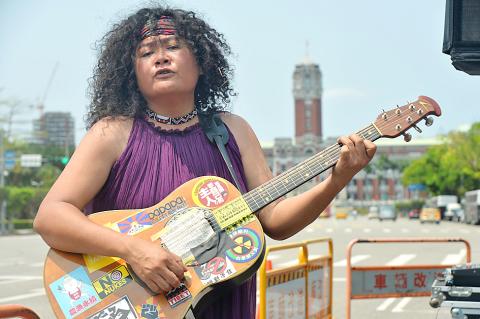Amis singer Panai Kusui yesterday said at a protest against the extension of Asia Cement Corp’s mining rights that the nation’s Aborigines have no hope, accusing the government of being insincere in its vow to protect Aboriginal land from exploitation.
Following a protest at the Executive Yuan in Taipei on Monday, environmental groups yesterday gathered in front of the Legislative Yuan to raise concerns about what they called an illegal extension of Asia Cement’s mining rights approved on March 14.
They urged lawmakers to review 13 proposed amendments to the Mining Act (礦業法) in the current extraordinary legislative session.

Photo: CNA
Premier Lin Chuan (林全) on Tuesday last week instructed the Ministry of Economic Affairs to explain within one week how the decision was made to extend Asia Cement’s permits, saying the amendments would be reviewed in the next legislative session in September.
On Monday, the ministry said that its extension approval was not illegal.
In previous protests, the groups had cited Article 21 of the Indigenous Peoples Basic Act (原住民族基本法), which stipulates that development on Aboriginal land must be approved by the communities that would be affected.
However, the ministry said that the article did not apply to the extension of mining rights, citing a conclusion reached by the Executive Yuan in a meeting on Nov. 7 last year.
Panai, who has spent the past 118 days camped on Ketagalan Boulevard to protest regulations relating to Aboriginal land, said the government has repeatedly deceived Aborigines over the Asia Cement case.
“This generation of Aborigines is without hope, because the nation uses laws to persecute us time and again,” she said.
“Are the laws really aimed at protecting people?” she asked. “How can ministers without portfolio Chang Ching-sen (張景森) and Lin Wan-i (林萬億) forcefully deprive us of our rights?”
Wild at Heart Legal Defense Association lawyer Hsieh Meng-yu (謝孟羽) said the ministry was distorting the law, citing its position that “land development activity” defined in the Geology Act (地質法) does not include the extension of mining rights.
The association has helped a few Aborigines reacquire their land from Asia Cement, Hsieh said, but added that they are still unable to use their land.
As Article 47 of the Mining Act enables companies to take pre-emptive action, “only when those people saw the [news on] TV did they know their lands were to be exploited by Asia Cement for another 20 years,” he said.
Citizen of the Earth, Taiwan researcher Pan Cheng-cheng (潘正正) said there are 188 active mines nationwide, but only 25 of them have been subject to environmental impact assessments.
Asia Cement’s mining activity in Hualien County’s Sincheng Township (新城) has come under renewed public criticism after aerial footage by filmmaker Chi Po-lin (齊柏林) appeared to show that the company had expanded its operations at the site, even though the firm said it had reduced them.
Chi died in a helicopter crash in Hualien on June 10 while filming a sequel to his documentary Beyond Beauty: Taiwan From Above (看見台灣).

Taiwanese can file complaints with the Tourism Administration to report travel agencies if their activities caused termination of a person’s citizenship, Mainland Affairs Council Minister Chiu Chui-cheng (邱垂正) said yesterday, after a podcaster highlighted a case in which a person’s citizenship was canceled for receiving a single-use Chinese passport to enter Russia. The council is aware of incidents in which people who signed up through Chinese travel agencies for tours of Russia were told they could obtain Russian visas and fast-track border clearance, Chiu told reporters on the sidelines of an event in Taipei. However, the travel agencies actually applied

Japanese footwear brand Onitsuka Tiger today issued a public apology and said it has suspended an employee amid allegations that the staff member discriminated against a Vietnamese customer at its Taipei 101 store. Posting on the social media platform Threads yesterday, a user said that an employee at the store said that “those shoes are very expensive” when her friend, who is a migrant worker from Vietnam, asked for assistance. The employee then ignored her until she asked again, to which she replied: "We don't have a size 37." The post had amassed nearly 26,000 likes and 916 comments as of this

New measures aimed at making Taiwan more attractive to foreign professionals came into effect this month, the National Development Council said yesterday. Among the changes, international students at Taiwanese universities would be able to work in Taiwan without a work permit in the two years after they graduate, explainer materials provided by the council said. In addition, foreign nationals who graduated from one of the world’s top 200 universities within the past five years can also apply for a two-year open work permit. Previously, those graduates would have needed to apply for a work permit using point-based criteria or have a Taiwanese company

The Shilin District Prosecutors’ Office yesterday indicted two Taiwanese and issued a wanted notice for Pete Liu (劉作虎), founder of Shenzhen-based smartphone manufacturer OnePlus Technology Co (萬普拉斯科技), for allegedly contravening the Act Governing Relations Between the People of the Taiwan Area and the Mainland Area (臺灣地區與大陸地區人民關係條例) by poaching 70 engineers in Taiwan. Liu allegedly traveled to Taiwan at the end of 2014 and met with a Taiwanese man surnamed Lin (林) to discuss establishing a mobile software research and development (R&D) team in Taiwan, prosecutors said. Without approval from the government, Lin, following Liu’s instructions, recruited more than 70 software